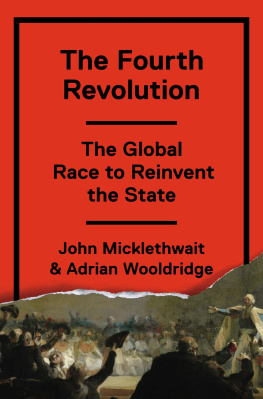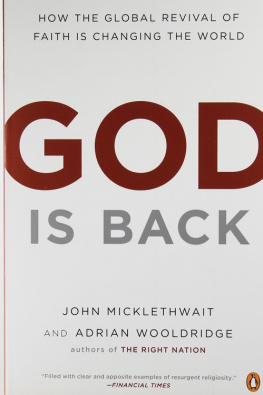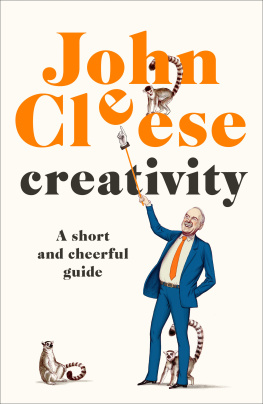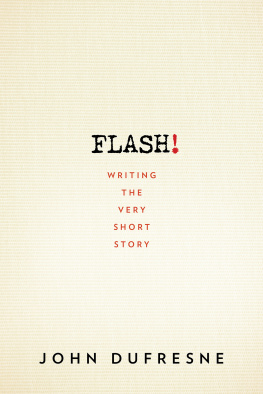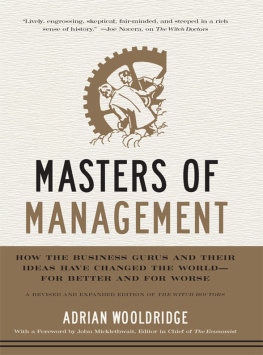John Micklethwait - The Company: A Short History of a Revolutionary Idea
Here you can read online John Micklethwait - The Company: A Short History of a Revolutionary Idea full text of the book (entire story) in english for free. Download pdf and epub, get meaning, cover and reviews about this ebook. year: 2003, publisher: Modern Library, genre: Business. Description of the work, (preface) as well as reviews are available. Best literature library LitArk.com created for fans of good reading and offers a wide selection of genres:
Romance novel
Science fiction
Adventure
Detective
Science
History
Home and family
Prose
Art
Politics
Computer
Non-fiction
Religion
Business
Children
Humor
Choose a favorite category and find really read worthwhile books. Enjoy immersion in the world of imagination, feel the emotions of the characters or learn something new for yourself, make an fascinating discovery.

- Book:The Company: A Short History of a Revolutionary Idea
- Author:
- Publisher:Modern Library
- Genre:
- Year:2003
- Rating:4 / 5
- Favourites:Add to favourites
- Your mark:
- 80
- 1
- 2
- 3
- 4
- 5
The Company: A Short History of a Revolutionary Idea: summary, description and annotation
We offer to read an annotation, description, summary or preface (depends on what the author of the book "The Company: A Short History of a Revolutionary Idea" wrote himself). If you haven't found the necessary information about the book — write in the comments, we will try to find it.
The Company: A Short History of a Revolutionary Idea — read online for free the complete book (whole text) full work
Below is the text of the book, divided by pages. System saving the place of the last page read, allows you to conveniently read the book "The Company: A Short History of a Revolutionary Idea" online for free, without having to search again every time where you left off. Put a bookmark, and you can go to the page where you finished reading at any time.
Font size:
Interval:
Bookmark:
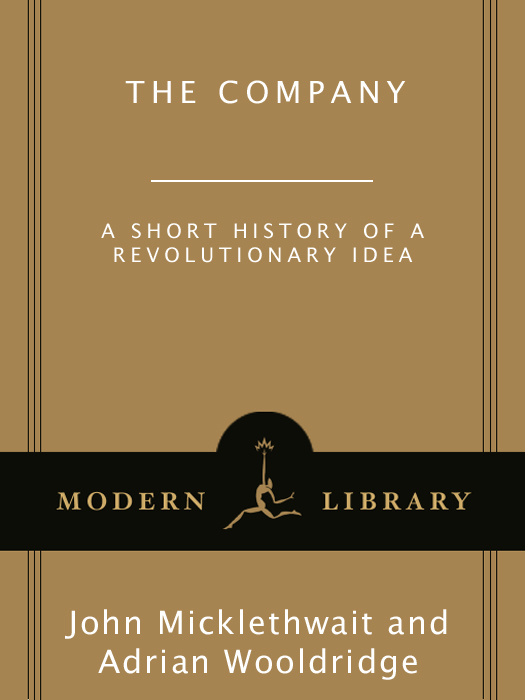
K AREN A RMSTRONG on Islam
D AVID B ERLINSKI on mathematics
R ICHARD B ESSEL on Nazi Germany
A LAN B RINKLEY on the Great Depression
I AN B URUMA on modern Japan
P ATRICK C OLLINSON on the Reformation
J AMES D AVIDSON on the Golden Age of Athens
S EAMUS D EANE on the Irish
F ELIPE F ERNNDEZ -A RMESTO on the Americas
L AWRENCE M. F RIEDMAN on law in America
P AUL F USSELL on World War II in Europe
J EFFREY G ARTEN on globalization
M ARTIN G ILBERT on the Long War, 1914-1945
P ETER G REEN on the Hellenistic Age
J AN T. G ROSS on the fall of Communism
A LISTAIR H ORNE on the age of Napoleon
P AUL J OHNSON on the Renaissance
T ONY J UDT on the Cold War
F RANK K ERMODE on the age of Shakespeare
J OEL K OTKIN on the city
H ANS K NG on the Catholic Church
E DWARD J. L ARSON on the theory of evolution
B ERNARD L EWIS on the Holy Land
F REDRIK L OGEVALL on the Vietnam War
M ARK M AZOWER on the Balkans
R OBERT M IDDLEKAUFF on the Gilded Age
P ANKAJ M ISHRA on the rise of modern India
A NTHONY P AGDEN on peoples and empires
R ICHARD P IPES on Communism
C OLIN R ENFREW on prehistory
J OHN R USSELL on the museum
C HRISTINE S TANSELL on feminism
K EVIN S TARR on California
A LEXANDER S TILLE on fascist Italy
C ATHARINE R. S TIMPSON on the university
N ORMAN S TONE on World War I
M ICHAEL S TRMER on the German Empire
S TEVEN W EINBERG on science
A. N. W ILSON on London
R OBERT S. W ISTRICH on the Holocaust
G ORDON S. W OOD on the American Revolution
J AMES W OOD on the novel
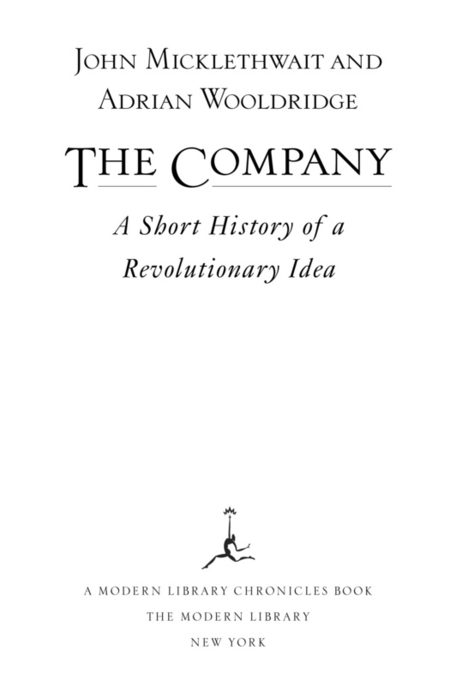
2003 Modern Library Edition
Copyright 2003 by John Micklethwait and Adrian Wooldridge
All rights reserved under International and Pan-American Copyright Conventions. Published in the United States by Modern Library, an imprint of The Random House Publishing Group, a division of Random House, Inc., New York, and simultaneously in Canada by
Random House of Canada Limited, Toronto.
M ODERN L IBRARY and the T ORCHBEARER Design are registered
trademarks of Random House, Inc.
LIBRARY OF CONGRESS CATALOGING-IN-PUBLICATION DATA
Micklethwait, John.
The company : a short history of a revolutionary idea /
John Micklethwait and Adrian Wooldridge.
p. cm.(Modern library chronicles)
eISBN: 978-1-588-36090-8
1. CorporationsHistory. 2. IncorporationHistory. 3. Business
enterprisesHistory. 4. EntrepreneurshipHistory. 5. Business
History. 6. CommerceHistory. 7. Economic history.
I. Wooldridge, Adrian. II. Title. III. Series.
HD2721 .M45 2003
338.7409dc21 2002026429
Modern Library website address: www.modernlibrary.com
v3.1
F OR R ICHARD AND J ANE M ICKLETHWAIT
AND B RIAN AND J ILL B LACKER
In the best capitalist tradition, this book has been built on the backs of many underpaid and abused workers. William and Ali Mackesy, Martin Thomas, Simon Green, Leslie Hannah, Jesse Norman, Robert Miles, Mark Doyle, and Helena Douglas all helped to improve the final product, though disappointed customers should be directed to the authors alone. We would also like to thank our agent, Andrew Wylie, and our unusually tolerant editor at Random House, Scott Moyers. Our editor at The Economist, Bill Emmott, has once again been extremely supportive, and we would also like to apologize to those poor soulsAnn Wroe, John Parker, Zanny Minton-Beddoes, Rachel Horwood, Venetia Longin, and Lucy Tallonwho have had to put up with us at close quarters. However, the main burden has yet again been shouldered, sometimes silently, by our wives and children. Our liability to them is indeed unlimited.
U TOPIA L IMITED
On the evening of October 7, 1893, a new operetta opened to a packed house in Londons West End. William S. Gilbert and Arthur Sullivan were the titans of Victorian popular culture, with amateur musical societies putting on performances of The Pirates of Penzance and The Gondoliers from Brighton to Bombay. Richard DOyly Carte had built a special theater at the Savoy just for their works. Adding to the air of expectation, the two writers had quarreled a few years earlier, partly because Sullivan aimed higher than mere comic opera, and it had looked as if their long collaboration was coming to an end. Now they were back.
One of the themes of Utopia Limited, or The Flowers of Progress, was not an obvious rib-tickler: the limited-liability joint-stock company. That nights operetta made fun of the idea that companies were sweeping all before them, enriching investors as they went. An English company promoter named Mr. Goldbury arrives in the exotic South Sea Island of Utopia and sets about turning the inhabitants into companies. Even babies issue company prospectuses. At one point in the final act, the King of Utopia demands, And do I understand you that Great Britain/Upon this Joint Stock principle is governed? And Mr. Goldbury replies, We havent come to that, exactlybut/Were tending rapidly in that direction/The dates not distant. Soon afterward, the Utopians join in one of the most improbable choruses ever set to music: All hail, astonishing Fact!/All hail, Invention new/The Joint Stock Companys Act/The Act of Sixty-Two!
For all its barbs, Utopia Limited sounded a triumphant note. It was a celebration of yet another quirky Victorian invention that had changed the world. The new companies, set free by the Act of 1862 and by its imitators in other countries, were speeding the first great age of globalization. They were luring millions of people off the land, changing the way that people ate, worked, and played. They were erecting the first towering offices in Manhattan and despoiling the Belgian Congo. They were battling with labor unions and challenging politicians. This is a government of the people, by the people and for the people no longer, warned President Rutherford B. Hayes: It is a government of corporations, by corporations and for corporations. The year before the curtain went up on Utopia Limited, the Ohio Supreme Court ruled that Standard Oil had created a monopoly. Even in Britain, which had nothing to match John D. Rockefellers oil empire, many of the bourgeois gentlemen chuckling knowingly in the boxes at the DOyly Carte theater owed their fortunes to the new device; and the stalls probably squeezed in at least one impoverished aristocrat who had blown his inheritance gambling on American railroad stocks.
Nowadays, the influence of this unsettling organization is even more pervasive. Hegel predicted that the basic unit of modern society would be the state, Marx that it would be the commune, Lenin and Hitler that it would be the political party. Before that, a succession of saints and sages claimed the same for the parish church, the feudal manor, and the monarchy. The big contention of this small book is that they have all been proved wrong. The most important organization in the world is the company: the basis of the prosperity of the West and the best hope for the future of the rest of the world. Indeed, for most of us, the companys only real rival for our time and energy is the one that is taken for grantedthe family. (Meanwhile, in a nice reversal of fortune, the worlds best-known family, the British monarchy, on whose whims and favors many of the earliest English joint-stock companies depended, now refers to itself as the firm.)
Font size:
Interval:
Bookmark:
Similar books «The Company: A Short History of a Revolutionary Idea»
Look at similar books to The Company: A Short History of a Revolutionary Idea. We have selected literature similar in name and meaning in the hope of providing readers with more options to find new, interesting, not yet read works.
Discussion, reviews of the book The Company: A Short History of a Revolutionary Idea and just readers' own opinions. Leave your comments, write what you think about the work, its meaning or the main characters. Specify what exactly you liked and what you didn't like, and why you think so.


